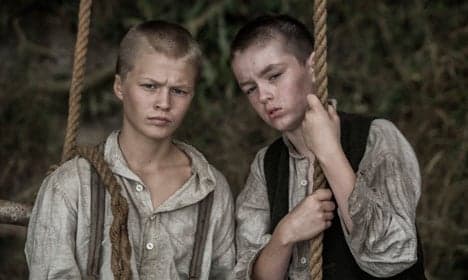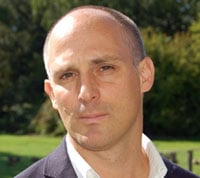Historical drama 1864 explains modern Danes

Long before the first episode even aired, DR's 1864 attracted controversy with its interpretation of Denmark's most crushing historical defeat, but columnist Michael Booth argues that very loss is what made the Danes what they are today.
So, did you see it on Sunday? Denmark’s most expensive drama series of all time, the eight part historical drama, 1864? If you did, you had plenty of company. Around 1.7 viewers tuned in. So, what did you think? On the one hand, it is probably precisely the kind of thing a national broadcaster should be making: a serious, heavyweight series examining the roots of contemporary Danish identity, a pivotal moment in its history, but with a clear relevance to the current government’s enthusiasm for war. On the other, I have to admit that I spent most of the time saying things like, ‘Isn’t that her from that thing?’ or ‘Was he the killer in The Killing, or the reporter?’ To put it another way, despite a budget of 173 million kroner of public money, the casting directors at DR are always going to be working with a ‘quality not quantity’ rolodex. Of course, there have already been complaints about the historical accuracy of 1864, whether or not the series properly represents the wider political-historic picture of what was happening in Europe at the time: the usual pedants popping up like whackamoles. They are missing the point. What’s really interesting about 1864, the year rather than the series, is this: Denmark’s darkest moment was probably the making of the modern Danes. By the time of the Second Schleswig War - which took place 150 years ago and is the subject of the series - Denmark had already lost its territories in southern Sweden and had lost Norway. It would go on, of course, to suffer occupation by Germany and lose Iceland, and loosen its grip on Greenland and the Faroes too. But 1864 was the biggie. Driven onward by some kind of mass, nationalistic ‘euphoria’ (as the show’s writer and director Ole Bornedal described it to Politiken last week), the country went to war with Germany and Austria and lost about a quarter of its land mass - some of its most valuable land, actually - as well as a large part of its population, in the Treaty of Vienna. Denmark did claw some back in the Treaty of Versailles, but by that stage the damage was done - not least because many ethnic Danes from the region were conscripted into the German army to fight in World War I). Over 5,000 Danish soldiers died fighting against Otto von Bismark’s far superior forces; understandably, those personal stories are the core of this new series. It was this loss, above all others, which forged the Danish character - insular, yes, but also appreciative of what they have both in terms of natural resources and cultural inheritance. Nationalistic, yes that too, but with that comes the deeply impressive social cohesion that has helped make the Danes so content (or ‘happy’), And, naturally, it instilled a deep-seated need for security and protection from the vagaries of fate, hence the comprehensive safety net provided from cradle to grave by the Danish welfare state. The Danes became a self-proclaimed nation of ‘tryghedsnarkomaner’, or safety addicts; a glass half full kind of people, tightly knitted, resilient, easily content. This is a gross simplification, of course, but you get the gist: the Danes may have lost that battle, but they won the life satisfaction war. In terms of the series itself, there is also something deeply impressive about a country which can face up to the less glorious moments from its past, not only that, but make arguably the greatest catastrophe in Danish history (besides the Eurovision overspending, of course) the subject of their most ambitious piece of television ever. It is, perhaps, the very definition of a confident, self assured nation. Put it another way: can you imagine the French making a film about the Battle of Agincourt?  Michael Booth is the author of The Almost Nearly Perfect People: The Truth About the Nordic Miracle available now on Amazon and is a regular contributor to publications including the Guardian and Monocle
Michael Booth is the author of The Almost Nearly Perfect People: The Truth About the Nordic Miracle available now on Amazon and is a regular contributor to publications including the Guardian and Monocle
Comments
See Also
So, did you see it on Sunday? Denmark’s most expensive drama series of all time, the eight part historical drama, 1864? If you did, you had plenty of company. Around 1.7 viewers tuned in. So, what did you think?
On the one hand, it is probably precisely the kind of thing a national broadcaster should be making: a serious, heavyweight series examining the roots of contemporary Danish identity, a pivotal moment in its history, but with a clear relevance to the current government’s enthusiasm for war. On the other, I have to admit that I spent most of the time saying things like, ‘Isn’t that her from that thing?’ or ‘Was he the killer in The Killing, or the reporter?’
To put it another way, despite a budget of 173 million kroner of public money, the casting directors at DR are always going to be working with a ‘quality not quantity’ rolodex.
Of course, there have already been complaints about the historical accuracy of 1864, whether or not the series properly represents the wider political-historic picture of what was happening in Europe at the time: the usual pedants popping up like whackamoles.
They are missing the point.
What’s really interesting about 1864, the year rather than the series, is this: Denmark’s darkest moment was probably the making of the modern Danes.
By the time of the Second Schleswig War - which took place 150 years ago and is the subject of the series - Denmark had already lost its territories in southern Sweden and had lost Norway. It would go on, of course, to suffer occupation by Germany and lose Iceland, and loosen its grip on Greenland and the Faroes too. But 1864 was the biggie.
Driven onward by some kind of mass, nationalistic ‘euphoria’ (as the show’s writer and director Ole Bornedal described it to Politiken last week), the country went to war with Germany and Austria and lost about a quarter of its land mass - some of its most valuable land, actually - as well as a large part of its population, in the Treaty of Vienna. Denmark did claw some back in the Treaty of Versailles, but by that stage the damage was done - not least because many ethnic Danes from the region were conscripted into the German army to fight in World War I). Over 5,000 Danish soldiers died fighting against Otto von Bismark’s far superior forces; understandably, those personal stories are the core of this new series.
It was this loss, above all others, which forged the Danish character - insular, yes, but also appreciative of what they have both in terms of natural resources and cultural inheritance. Nationalistic, yes that too, but with that comes the deeply impressive social cohesion that has helped make the Danes so content (or ‘happy’), And, naturally, it instilled a deep-seated need for security and protection from the vagaries of fate, hence the comprehensive safety net provided from cradle to grave by the Danish welfare state. The Danes became a self-proclaimed nation of ‘tryghedsnarkomaner’, or safety addicts; a glass half full kind of people, tightly knitted, resilient, easily content.
This is a gross simplification, of course, but you get the gist: the Danes may have lost that battle, but they won the life satisfaction war.
In terms of the series itself, there is also something deeply impressive about a country which can face up to the less glorious moments from its past, not only that, but make arguably the greatest catastrophe in Danish history (besides the Eurovision overspending, of course) the subject of their most ambitious piece of television ever. It is, perhaps, the very definition of a confident, self assured nation.
Put it another way: can you imagine the French making a film about the Battle of Agincourt?
 Michael Booth is the author of The Almost Nearly Perfect People: The Truth About the Nordic Miracle available now on Amazon and is a regular contributor to publications including the Guardian and Monocle
Michael Booth is the author of The Almost Nearly Perfect People: The Truth About the Nordic Miracle available now on Amazon and is a regular contributor to publications including the Guardian and Monocle
Join the conversation in our comments section below. Share your own views and experience and if you have a question or suggestion for our journalists then email us at [email protected].
Please keep comments civil, constructive and on topic – and make sure to read our terms of use before getting involved.
Please log in here to leave a comment.